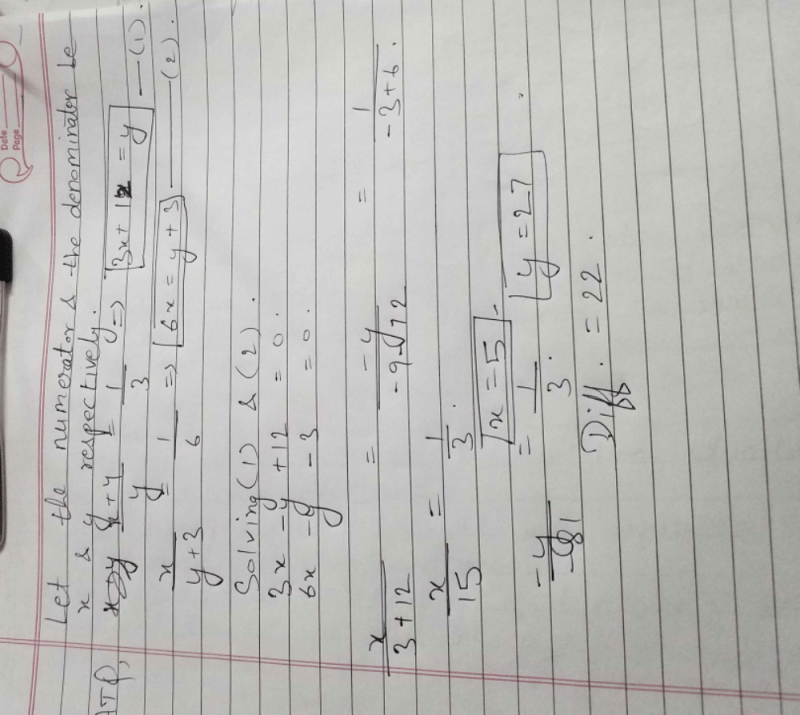Quant Exam > Quant Questions > If 4 is added to the numerator of a fraction ...
Start Learning for Free
If 4 is added to the numerator of a fraction it becomes 1/3 and if 3 is added to the denominator it becomes 1/6 then find the difference between numerator and denominator is
- a)20
- b)21
- c)22
- d)24
- e)None of these
Correct answer is option 'C'. Can you explain this answer?
Verified Answer
If 4 is added to the numerator of a fraction it becomes 1/3 and if 3 i...
(a +4)/b = 1/3 and a/(b+3) = 1/6 solve both the equations, u will get a = 5 and b = 27
Most Upvoted Answer
If 4 is added to the numerator of a fraction it becomes 1/3 and if 3 i...

Free Test
FREE
| Start Free Test |
Community Answer
If 4 is added to the numerator of a fraction it becomes 1/3 and if 3 i...
Let the fraction be x/y.
Adding 4 to the numerator, we get (x+4)/y.
According to the first condition, (x+4)/y = 1/3.
Cross-multiplying, we get 3(x+4) = y.
Adding 3 to the denominator, we get x/(y+3).
According to the second condition, x/(y+3) = 1/6.
Cross-multiplying, we get 6x = y+3.
Now we have two equations:
3(x+4) = y
6x = y+3
Substituting the value of y from the first equation into the second equation, we get:
6x = 3(x+4) + 3
Simplifying, we get:
3x = 15
x = 5
Substituting x=5 into one of the equations, we get:
y = 3(x+4) = 27
Therefore, the fraction is 5/27.
The difference between the numerator and denominator is 27-5 = 22.
Hence, the correct answer is option C (22).
Adding 4 to the numerator, we get (x+4)/y.
According to the first condition, (x+4)/y = 1/3.
Cross-multiplying, we get 3(x+4) = y.
Adding 3 to the denominator, we get x/(y+3).
According to the second condition, x/(y+3) = 1/6.
Cross-multiplying, we get 6x = y+3.
Now we have two equations:
3(x+4) = y
6x = y+3
Substituting the value of y from the first equation into the second equation, we get:
6x = 3(x+4) + 3
Simplifying, we get:
3x = 15
x = 5
Substituting x=5 into one of the equations, we get:
y = 3(x+4) = 27
Therefore, the fraction is 5/27.
The difference between the numerator and denominator is 27-5 = 22.
Hence, the correct answer is option C (22).

|
Explore Courses for Quant exam
|

|
Question Description
If 4 is added to the numerator of a fraction it becomes 1/3 and if 3 is added to the denominator it becomes 1/6 then find the difference between numerator and denominator isa)20b)21c)22d)24e)None of theseCorrect answer is option 'C'. Can you explain this answer? for Quant 2025 is part of Quant preparation. The Question and answers have been prepared according to the Quant exam syllabus. Information about If 4 is added to the numerator of a fraction it becomes 1/3 and if 3 is added to the denominator it becomes 1/6 then find the difference between numerator and denominator isa)20b)21c)22d)24e)None of theseCorrect answer is option 'C'. Can you explain this answer? covers all topics & solutions for Quant 2025 Exam. Find important definitions, questions, meanings, examples, exercises and tests below for If 4 is added to the numerator of a fraction it becomes 1/3 and if 3 is added to the denominator it becomes 1/6 then find the difference between numerator and denominator isa)20b)21c)22d)24e)None of theseCorrect answer is option 'C'. Can you explain this answer?.
If 4 is added to the numerator of a fraction it becomes 1/3 and if 3 is added to the denominator it becomes 1/6 then find the difference between numerator and denominator isa)20b)21c)22d)24e)None of theseCorrect answer is option 'C'. Can you explain this answer? for Quant 2025 is part of Quant preparation. The Question and answers have been prepared according to the Quant exam syllabus. Information about If 4 is added to the numerator of a fraction it becomes 1/3 and if 3 is added to the denominator it becomes 1/6 then find the difference between numerator and denominator isa)20b)21c)22d)24e)None of theseCorrect answer is option 'C'. Can you explain this answer? covers all topics & solutions for Quant 2025 Exam. Find important definitions, questions, meanings, examples, exercises and tests below for If 4 is added to the numerator of a fraction it becomes 1/3 and if 3 is added to the denominator it becomes 1/6 then find the difference between numerator and denominator isa)20b)21c)22d)24e)None of theseCorrect answer is option 'C'. Can you explain this answer?.
Solutions for If 4 is added to the numerator of a fraction it becomes 1/3 and if 3 is added to the denominator it becomes 1/6 then find the difference between numerator and denominator isa)20b)21c)22d)24e)None of theseCorrect answer is option 'C'. Can you explain this answer? in English & in Hindi are available as part of our courses for Quant.
Download more important topics, notes, lectures and mock test series for Quant Exam by signing up for free.
Here you can find the meaning of If 4 is added to the numerator of a fraction it becomes 1/3 and if 3 is added to the denominator it becomes 1/6 then find the difference between numerator and denominator isa)20b)21c)22d)24e)None of theseCorrect answer is option 'C'. Can you explain this answer? defined & explained in the simplest way possible. Besides giving the explanation of
If 4 is added to the numerator of a fraction it becomes 1/3 and if 3 is added to the denominator it becomes 1/6 then find the difference between numerator and denominator isa)20b)21c)22d)24e)None of theseCorrect answer is option 'C'. Can you explain this answer?, a detailed solution for If 4 is added to the numerator of a fraction it becomes 1/3 and if 3 is added to the denominator it becomes 1/6 then find the difference between numerator and denominator isa)20b)21c)22d)24e)None of theseCorrect answer is option 'C'. Can you explain this answer? has been provided alongside types of If 4 is added to the numerator of a fraction it becomes 1/3 and if 3 is added to the denominator it becomes 1/6 then find the difference between numerator and denominator isa)20b)21c)22d)24e)None of theseCorrect answer is option 'C'. Can you explain this answer? theory, EduRev gives you an
ample number of questions to practice If 4 is added to the numerator of a fraction it becomes 1/3 and if 3 is added to the denominator it becomes 1/6 then find the difference between numerator and denominator isa)20b)21c)22d)24e)None of theseCorrect answer is option 'C'. Can you explain this answer? tests, examples and also practice Quant tests.

|
Explore Courses for Quant exam
|

|
Signup for Free!
Signup to see your scores go up within 7 days! Learn & Practice with 1000+ FREE Notes, Videos & Tests.
























